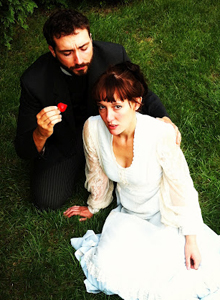
A PRE-MODERN PARABLE Hardy’s Tess is still relevant today. |
That we have not yet fully outlived the Victorians seems self-evident, given the political right's priggishly austere agenda for women's reproductive health and rights. And so while the particulars of Thomas Hardy's novel Tess of the D'Urbervilles might appear dated — its peasant girl raped by one aristocrat and later discarded for that "offense" by another — the larger social dynamics that the novel damns — patriarchal moral hypocrisy and an ascetic idealism with no basis in reality — are hardly beyond us. The relevance of Tess is clear even without a flashily modernized staging, and Dead Wessex Fair Productions stages a gratifying classical production at Lucid Stage, adapted by and starring April Singley as the wronged Tess Durbeyfield, under the direction of Harlan Baker.Tess is first the victim of the class aspirations of her uneducated father (Michael Tooher), when he learns that their rural English clan shares blood with the noble, wealthy D'Urbervilles, and sends Tess over to ingratiate herself. The libertine D'Urberville son Alec (Andrew Sawyer), takes a shine to Tess, hires her as a hand, and later ravishes her. About nine months later, Tess buries the result and starts work at a dairy, where she attracts the love of apprentice farmer Angel Clare (Jesse Leighton) and agonizes over whether to reveal to him her secret. Against the advice of her mother (the wonderful Janet Lynch) she finally does so on their wedding night, and suffice it to say that he does not take it well.
Dead Wessex Fair's production is minimally and rustically set to accommodate many scenes, and traditional singing (by Lynch, and by the excellent village maids Heather Irish, Elizabeth Lardie, and Kat Moraros) conveys some cultural flavor of rural Wessex. The production also conjures setting with occasional images projected onto the center-stage floor — pastoral landscapes, religiously themed paintings — in an effect that, despite feeling somewhat at odds with the otherwise spare staging, does heighten both the landscape and the moral consciousness of where Tess lives.
The actress portraying her is an intense performer, and has often blazed on other stages in vivid and sometimes very sexual roles. Tess calls for considerably more restraint, and Singley does bring it down: her Tess has an emphatic plainness and steadiness of gaze. Her expressive eyes suit Tess well as they seek approval, express alarm, or convey innocently sensuous delight. At the same time, her Tess is unshrinking and vigorously strong. If she seems at moments a little too strident, her force of character also sets up an illuminating power dynamic with the culturally powerful men who desire and wrong her.
These men, in Sawyer's and Leighton's hands, are not malicious; they have culturally prescribed power, but in comparison with Tess, they aren't even particularly forceful personalities. Sawyer's Alec has a smooth, smarmy, coddled entitlement; Leighton nicely relates the poetically vague narcissism of Angel and his impossible ideals. The two come across not as evil villains, but as rather too-familiar men: self-absorbed, shallow, paternalist schlubs who believe their actions reasonable. They are merely products of the culture that is itself the ultimate antagonist in Hardy's tragedy.